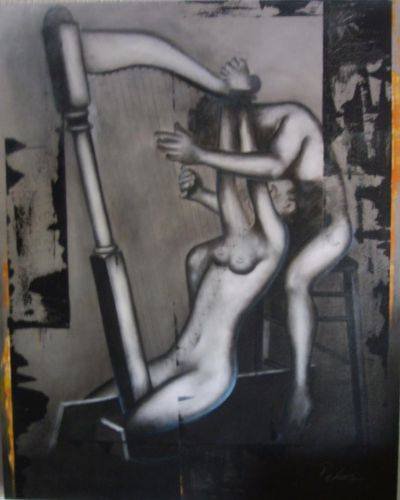Judith Butler
I understand in Butler’s essay Gender is Burning: Questions of Appropriation and Subversion how ‘gender is burning’ (through her look into the film Paris is Burning). This means to me that gender over all, is a construction; or a ‘fiction’ as is sustained towards the end of the essay. Furthermore, this means that there is no ‘true’ gender. The widely accepted notion that heterosexuality, and the gender identities, binary, it implies, is shattered, it is invalidated. Here then Butler presents the notion of hegemony to the category of gender. Here, there are all sort different divisions that become problematic. There is the masculine and there is the feminine; there is the white and there is the colored; there is the poor and there is the rich. This is very complex and it can certainly lead to, as Butler asserts, “constructions that belong to larger hegemonies of oppression,” in dismissal of the simplistic critique of ‘black male misogyny’ as was written in a critique made of the film. The problems presented in the film are indeed much bigger than just the problem of it portraying black male misogyny; or maybe not even reducible to that. This is where I have some doubts on Butler’s position on the ‘subversive’ aspect of the identity representations in the film. Perhaps I don’t have a problem with the notion of being rebellious, but I do with the explicit use of the notion of being subversive.
The represented identity may be subversion of a social norm, or more precisely a gender norm, but it loses all subversive intensity when it has been appropriated by the market, capitalist, system. Then it is normalized, but it has not affected the social conditions that are more pressing than gender identity (or at least the conditions that affect even the existence of such cultural formations represented in the film), the conditions that the capitalist system (society) is not willing, not able, to change, due to its nature of existence, which are that of poverty, domination, repression, exploitation, and others. Then it follows this appropriation/democratic subversion->Appropriation (Normalizing/defeated subversive). This is very explicit in the film: everyone’s desire to be a star. But there also is explicit in the film, which Butler (or the Hooks, whom she criticizes) something of the real problem: there is a character in the film that states that the real dominating condition is their economic situation; he/she says that if they had millions of dollars they would share with everyone they know to alleviate their poverty hardship (At least remember having heard it at some point in the film in that way). I’m not saying that if this happened, all the social problems would be solved; that is not true either. What I think is that the film exposes, yes gender matters, but much more pressing issues that correspond to a universal situation and not just the particular instance of black/latino gay men.
bell hooks
The tittle to bell hooks’ essay Is Paris Burning? says a lot about the character of the essay. It is obviously making reference to the tittle of Livingston’s documentary Paris is Burning, which is the focus and object of a very strong critique. Turning the documentaries tittle into a question has many effects. One effect is to question the overall project of the documentary. This documentary shows (exposes) the underground (is it redundant to say underground in this context?) drag culture of homosexual men in New York; more specifically of black and latino men. The life of these homosexual, outcasts most of them, is centered on the important events known as balls. These are competitions where the competitors try to be the best imitators of a certain fashion or social identity; most notably of women. Now there is glamour in this event and a remaking, or again imitating, of fashion presentation walk ways. The competitors walk and model their clothing, their appearance, their style, their makeup, and the work they put into their overall look. It basically is an imitation of high fashion, high culture trend and identity setting; hence the reference to the French city of Paris. But in this tittle, an affirmation, why is Paris burning? Because there is a satire of the fashion and glamour activity that takes place in Paris. The activities of these homosexuals, which is very much counter to the high class culture of Paris, makes a mockery of said high class culture and maybe even of the conditions that allow that high class cultural practice to take place. These obscure and low culture activity will make Paris burn with rage for the mockery that is made, by these racially subaltern homosexual men, of their highly cherished fashion and identity. So hooks questions this project. Has the documentary effectively made a critique (which is what a satire is) to that highly structured and exclusive world Parisian fashion and by extension to high class culture as well? Hooks thinks not. Hooks on the contrary, feels that film is in fact a mockery of black gay men, black identity overall, and even, most important to a feminist hooks, a mockery and further repression of the black woman. Even though hooks’ critique of the film is lacking in some areas, there are others that touch on very important points. The tittle in hooks’ essay is the first sign of a heavy critique to the film, but also a misreading of ‘why’ Paris would be burning.
